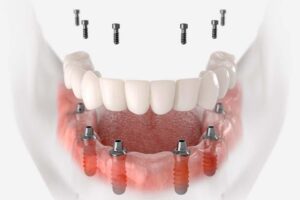
Proper oral care is crucial to ensure good overall health and well-being. This means brushing your teeth at least twice a day, flossing daily, visiting your family dentist plymouth in regularly, and practicing other good dental habits.
What about your baby? Every parent should know that proper oral care should start even before their child’s first baby tooth erupts. This is imperative to make sure that your child will have healthy teeth and gums as they grow up. But how?
Competent and caring dentists share here seven tips for caring for your baby’s teeth:
1. Wipe gums with cloth or gauze
Newborn babies have 20 teeth below their gums. Although the bacteria in their mouth don’t usually cause hard damage to these teeth, it is difficult to predict when they’ll erupt. Thus, it is crucial for you to wipe your baby’s gums with a soft cloth or gauze every day, preferably while you are bathing him.
Toothpaste is not necessary yet at this stage. All you have to do is to wrap the gauze or cloth around your index finger and rub it over his gums slowly and lightly. Doing so will also make tooth brushing a lot easier later on.
2. Brush with fluoride toothpaste
As soon as the first tooth appears, which usually happens at the age of three to six months, you should start brushing it immediately. Don’t delay because tooth decay can already happen at this age. So if you see a pearly white tooth when your baby smiles, grab a baby-friendly toothbrush and place just a smear of fluoride toothpaste on it. Do proper brushing at least twice a day.
Remember to brush gently both on the inside and outside of each baby tooth. Brush his tongue as well to remove any bacteria that may cause bad breath. And since you are only using a bit of toothpaste, rinsing isn’t necessary.
Take note that you can only increase the amount of fluoride toothpaste when your child reaches the age of three. By this time, he can brush his teeth on his own, spit out the toothpaste, and rinse after.
3. Prevent baby bottle tooth decay
Putting babies to bed with a bottle of milk is common among parents. To ensure healthy baby teeth, avoid doing this. Be aware that exposing your baby’s teeth to milk and other beverages that have sugar for a long time can lead to tooth decay.
So as soon as you notice that your baby isn’t feeding anymore, remove the bottle out of his mouth right away. Signs of cavities include minor pitting and discoloration.
4. Clean between any teeth that touch
Flossing should only be done when your baby’s tooth surfaces touch. Make sure to use a child-friendly plastic flossing tool as this makes flossing a lot easier.
5. Increase your baby’s fluoride intake
The minimal smear of toothpaste you use on your baby’s teeth is not enough to strengthen tooth enamel and prevent tooth decay once he is more than six months old. Thus, you should regulate your child’s fluoride intake.
For instance, give him fluoridated water. In cases wherein this is not yet enough, a fluoride supplement might be necessary. Consulting a family dentist before supplementation is crucial because too much fluoride can do more harm than good.
6. Schedule the first dental exam
Your baby’s first dental exam should be scheduled when his first tooth appears or when he’s one year old. During this visit, inform the dentist if your baby’s doctor has been checking his teeth or has applied fluoride varnish at every well-baby visit. If the dentist is fully aware of your baby’s dental history, he will be able to develop the best dental care plan for your child.
7. Offer tooth-friendly food and beverages
What your baby eats can have an effect on his oral health. Remember that some foods are healthier than others. Foods that will keep your baby’s teeth healthy include milk, fruits, vegetables, cheese, and yoghurt., so make sure to include these once your child starts eating solid foods.
On the contrary, avoid giving him sugary foods like candy, dried fruits, and crackers because these can lead to cavities and tooth decay. Otherwise, you should serve these foods with water to prevent food remnants from sitting on your child’s teeth for too long.
As a parent, you should know that taking care of baby teeth is crucial because permanent teeth will replace them soon. So begin taking care of them as soon as the first baby tooth erupts.
In addition to the provided tips, you should also invest in preventative dentistry services as early as possible. By doing so, cavity formation and tooth decay affecting permanent teeth spacing will be prevented, and your child will have a greater chance of achieving a truly healthy and beautiful smile.
AUTHOR BIO
Dr. Yvette Porter is the founding dentist at Apple Dental in Newstead, Brisbane, which she started over 11 years ago, and continues to own and practice there today. She works with a team of female dentists who aim to provide gentle, and affordable dental care to patients in Brisbane. Dr. Porter is a member of the Australian Dental Association and is passionate about family, and children’s dentistry, hoping to make their dental experience truly pleasant.




